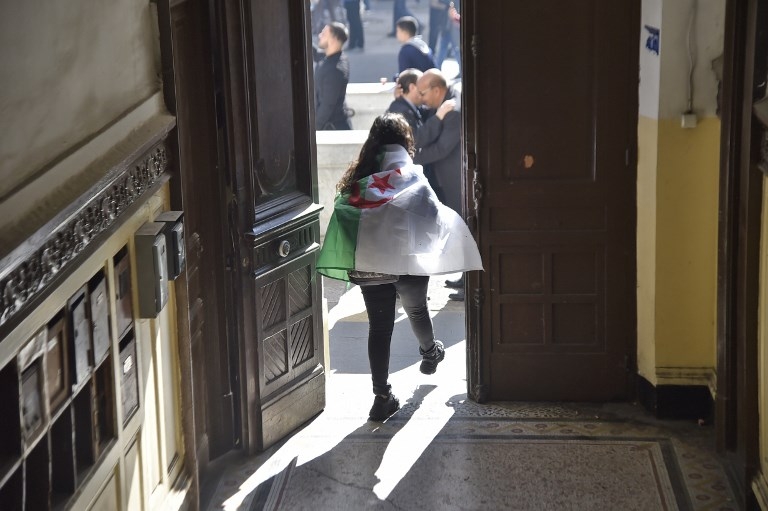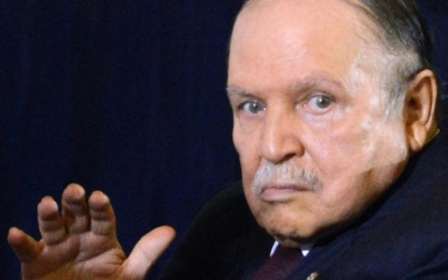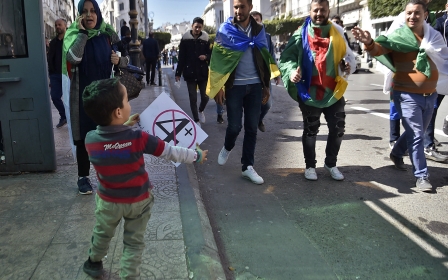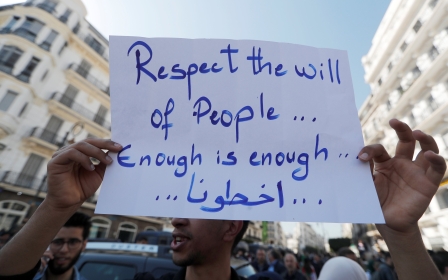In Algiers, the 'revolution of smiles' spreads everywhere

In Hussein Dey, a neighbourhood on the periphery of Algiers, Hasna, Abdou, Manel and a dozen other classmates are clustered together outside their high school after classes on 12 March, focused on their mobiles.
The group is flipping through photographs and videos of different banners held during recent demonstrations.
“Yes, this one is good, but it needs to be changed a little after what happened yesterday,” says Hasna, 17, her school apron tied around her waist, a band in the colours of the Algerian flag wrapped on her wrist.
After the statements attributed to President Abdelaziz Bouteflika on 11 March regarding the cancellation of presidential elections that had been set for 18 April and the extension of his mandate, the teenagers want to update the mottos of the protests.
“We have adopted a new slogan: ‘Bouteflika, not one minute more!’” the merry band announces.
New MEE newsletter: Jerusalem Dispatch
Sign up to get the latest insights and analysis on Israel-Palestine, alongside Turkey Unpacked and other MEE newsletters
Abdou, an athletic looking young man with sunglasses, is the group's “secretary”. On pages torn out of his class notebooks, he summarises the group’s proposals, maps out trajectories for marches planned to take place on 15 March to denounce the “life mandate” of the head of state.
‘Even Arab channels were mocking us!’
"They're swift up there, things change all the time! The people forced them to change their film's script several times. It's a good thing they're afraid of us," says Abdou.
“At first, the teachers were afraid of the school principal, of our parents’ reactions,” explains Ryma, the youngest of the squad. “But things are changing, now they trust us, they encourage us. We aren’t breaking anything, we don’t insult anyone, we even make sure not to provoke police officers… My uncle is a police officer, I can’t hate him, even he is disgusted by what is happening.”
A little further down on Tripoli Street, Rabah, 68, a beret covering his bald head and a cigarette hanging from his mouth, speaks with neighbours of the same age outside an old building that looks near collapse, like most century-old edifices in the area. All are holding newspapers, which they brandish when the conversation gets particularly heated.
Translation: Algeria is magnificent! This scene could be called "Ode to Peace", any other suggestions?
“Me, I’m going out to protest,” Ammi Rabah, or "Uncle Rabah" as he is known, exclaims defiantly. “The hajja [Rabah’s wife] doesn’t give me a choice,” he adds with a mischievous smile, prompting laughter from his neighbours.
“We had become the laughing stock of the world, even Arab channels were mocking us!” the retired railroad worker adds indignantly.
He speaks about how he had forbidden his eldest daughter to participate in protests the previous three weeks out of fear of violence - in vain. “She convinced me by telling me we need to claim our dignity back. I had nothing to respond to that.
“They debase us with this president who will not leave, but we won’t accept this with bowed heads,” the sexagenarian says, shaking his newspaper. “When you are humiliated, nobody respects you, not abroad, not your family, no one.”
The discussion grows more animated as the neighbours bring up the possibility of organising a neighbourhood committee.
“Before, we were all isolated from one another, we were all dealing with our own issues alone. Now we want to be together, create a committee for the building and for the neighbourhood, we want to clean up, fundraise to fix our dilapidated street, discuss together what is happening in this country,” Ammi Rabah says with enthusiasm.
‘Before, we were all isolated from one another. Now we want to be together’
- Rabah, pensioner from Algiers
“For too long, we have left our affairs in the hands of these gangsters in power,” he concludes, before berating a reticent neighbour hesitant about the work ahead.
In central Algiers, Halim closes his laptop and thanks the waiter who allowed him to work in a corner of this cafe near Emir Abdelkader Square.
Him and a number of fellow students and youth of diverse backgrounds have just wrapped up a “working session” on the new website 22fevrier2019.com, in reference to the first demonstrations of 22 February. Launched on 13 March, the online platform aims to aggregate all the demands and proposals of Algerian youth, with an option to vote on each of the suggested ideas.
Halim is studying to become a translator-interpreter at the central university, whose students have maintained pressure in the city centre to demand “the change of the system”.
“Too many people want to speak for us, some political pros will certainly claim [the movement],” the young man exclaims, point to his laptop between an empty cup of coffee and an ashtray filled with cigarette butts. “But on the internet, it is us the people who are sovereign. We make the decisions.”
Between calls for a referendum, decentralisation, judicial enquiries into all officials and highest levels of power.... the proposals are numerous and varied, but all “speak to a thirst for real democracy in a country where institutions seem to crumble one after the other,” says Halim, who is already coordinating with his comrades the logistics of the next demonstration.
“The goal is to obtain in a fairly short time frame a platform of consensual and unified demands to impose on decision-makers under pressure from giant demonstrations,” the student adds while typing on his phone
Operation Post-it
Another initiative launched last week has seen Algerian students hang thousands of Post-it notes - later ripped off by the police - on the walls of Place Maurice Audin Square in the city centre. Slogans, proposals and various messages were written down - "a way of saying you're talking to a wall", explains Sara, in her second year of medical school.
From this idea was born the Facebook page "Post_it_ga3": gaa, ("all" in darija Arabic) refers to a widely shared video in which a young man interrupts a TV reporter from an Arab channel, and, refusing to speak in classical Arabic as is usually the case on news programmes, said: "Yetnahaou gaa! "('they must all be destituted!') when speaking about the Algerian leaders.
On Post_it_ga3, Algerians are invited to take a picture of an annotated Post-it showing an idea or request, thus creating a virtual wall of young people's demands.
In Algiers, initiatives are proliferating: last Monday, and for the second time, artists and intellectuals led a debate in Port-Said Square, in front of the National Theatre - an unusual sight in the Algerian capital where gatherings are usually prohibited.
Last Thursday, Algiers' biggest soccer match, the USMA-MCA derby between the capital's two rival clubs, was boycotted by supporters of both teams to denounce the situation in the country.
"Algiers is so beautiful when it revolts," says a smiling passerby on Didouche Mourad Street, where police officers have been stationed for more than three weeks. "The town will be even more beautiful this Friday," the man adds, ahead of the demonstrations on 15 March.
- The article is an edited translation of a story originally published by Middle East Eye's French website.
Middle East Eye delivers independent and unrivalled coverage and analysis of the Middle East, North Africa and beyond. To learn more about republishing this content and the associated fees, please fill out this form. More about MEE can be found here.




